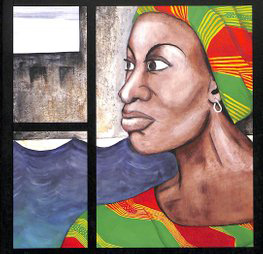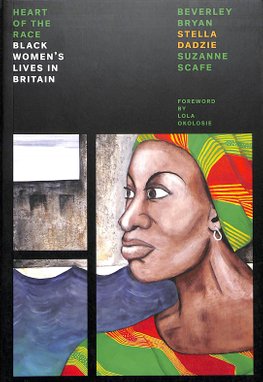The Heart of the Race is a classic of Black British women’s history. First published in 1985, the book filled in large gaps in British history, which had traditionally neglected the Black experience altogether before belatedly including the perspective of Black men while still largely excluding women.
This was the first book to lay out a comprehensive history of Black women’s experiences in Britain and to chart the current state of affairs in the fields of work, education, health, activism, culture and identity.
The first thing to say about this book is that it struck me as surprisingly contemporary. That’s a good thing for the reading experience and a bad thing for British society.
The authors (Beverly Bryan, Stella Dadzie and Suzanne Scafe) present a community engaged in a struggle for better conditions in the midst of a largely hostile society that wants to pen them into a world of menial jobs, poor housing and diminished prospects. It describes Black women being scapegoated by the media as “having a child-like dependence upon a benevolent caring (white) society.”
Thirty-five years later, we should be viewing things like this as ancient history, but can we really say that we have moved beyond them?
Speaking for a Community
The next thing to say is that The Heart of the Race has a unique style, and that style works very well. It’s written in first person plural, talking of Black women’s experiences as “we” and “us” and “our”, which in theory shouldn’t work at all. How can three writers claim to speak for all Black British women?
And yet, for me at least, it was very effective. Using the “we” voice gives the book a highly personal feel, even in its more academic, research-based moments. It also has a powerful unifying effect, creating a clear sense of a coherent community with a shared history and somewhat common present-day experiences, even allowing for the vast diversity of individual life choices and situations.
The Ties That Bind
The Heart of the Race starts with a powerful introduction called “The Ties That Bind”, in which the authors give a history of Black British women that begins, unexpectedly but appropriately, with the African cultures that existed before European colonisation and takes us through the plunder, enslavement and exploitation that ensued. It makes the self-evident but often forgotten point:
“It was the blood, sweat and tears of Black women and men which financed and serviced Europe’s Industrial Revolution, a revolution which laid the basis for Europe’s subsequent domination and monopoly of the world’s resources.”
I say that this point is often forgotten, but perhaps it would be more accurate to say it’s deliberately obscured. When British schoolchildren learn about the Industrial Revolution, it’s largely a story of ingenuity and clever inventions: a marvel produced by the steam engine and the spinning jenny.
That other story, about millions of people being worked to death to produce the raw materials for the cotton mills and the profits to fund a total transformation of society, is told, but as a separate, unrelated story, an unfortunate episode that was ended by benevolent white abolitionists and had no lasting consequences.
This slanted version of history does us all a disservice. It leaves us unprepared to deal with a world in which the consequences of our history are finally unavoidable. Correctives like that offered in The Heart of the Race are vital.
A Powerful Oral History
From there, the authors lay out the challenges facing Black women in the arenas of work, education, health, activism, culture and identity. It’s quite a grim picture, but the authors always assert the power and agency of Black women even in the face of such major challenges.
“Such images of Black women as downtrodden victims may well disclose one dimension of the realities we have lived through, but they fail to reveal the fact that our very survival has depended on our militant responses to tyranny.”
A large part of the success of The Heart of the Race is due to its use of oral history. The book is narrated by its three authors and draws on research materials, but it is also liberally peppered with stories told by individual Black women about their own experiences. This approach gives the book a much broader reach, making it a valuable document for anyone who wants to know what life was like for Black women in Britain in the mid to late 20th century.
I’d recommend this book to anyone who, like me, studied history in Britain and felt that something was missing. It’s a classic for a good reason, and it fills in some important gaps in how we are taught to think about British history and identity.
Black History Month 2020
This post was written for Black History Month, which the UK marks in October. It’s a bit ironic because the authors state in an appended interview to this edition of the book that we should move beyond Black History Month, viewing Black history as an integral part of British history and studying it throughout the year instead of relegating it to a single month.
I can see their point, and in an ideal world I think there would be no need for Black History Month. Probably that time will come, but honestly I don’t think we’re there yet. I think that history is still largely the possession of the dominant group, and we should grab any chance we have to highlight the histories of excluded groups.
That’s why this book is so important. Perhaps, one day, Black women’s experiences will be valued as highly as those of white men, and they’ll be included in more general histories and sociological surveys, and we won’t need books like The Heart of the Race. But for now, we need it just as much as we needed it in 1985.





There is 1 comment
BuriedInPrint left an interesting comment, but it was lost due to some kind of glitch. She raises some important points about language and how it can be used to include or exclude people. Here it is:
What an essential work. And what an interesting stylistic choice, to use the plural as a pronoun and risk suggesting that a few people can speak for an entire community. But it does make sense from the perspective of trying to look for the common experiences among Black women. That reminds me of a recent episode of “Code Switch” (on NPR) in which they discussed the merits of using the terms ‘POC’ and ‘BIPOC’ and how different people felt different degrees of belonging depending on how collective terms, like these, are used or dismissed.